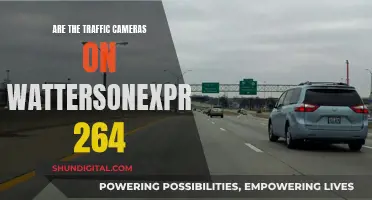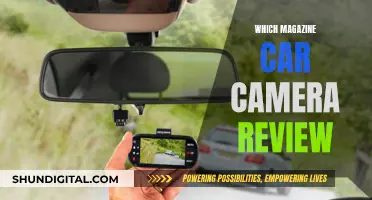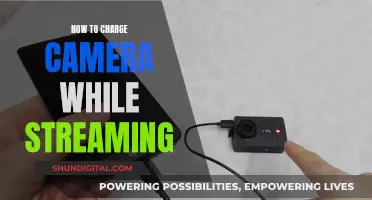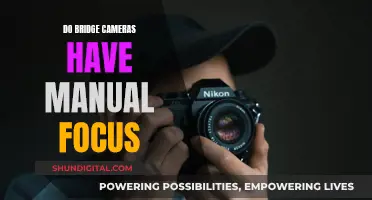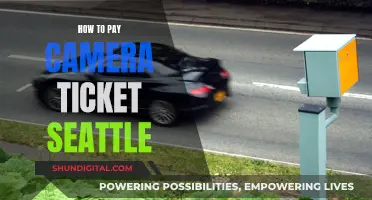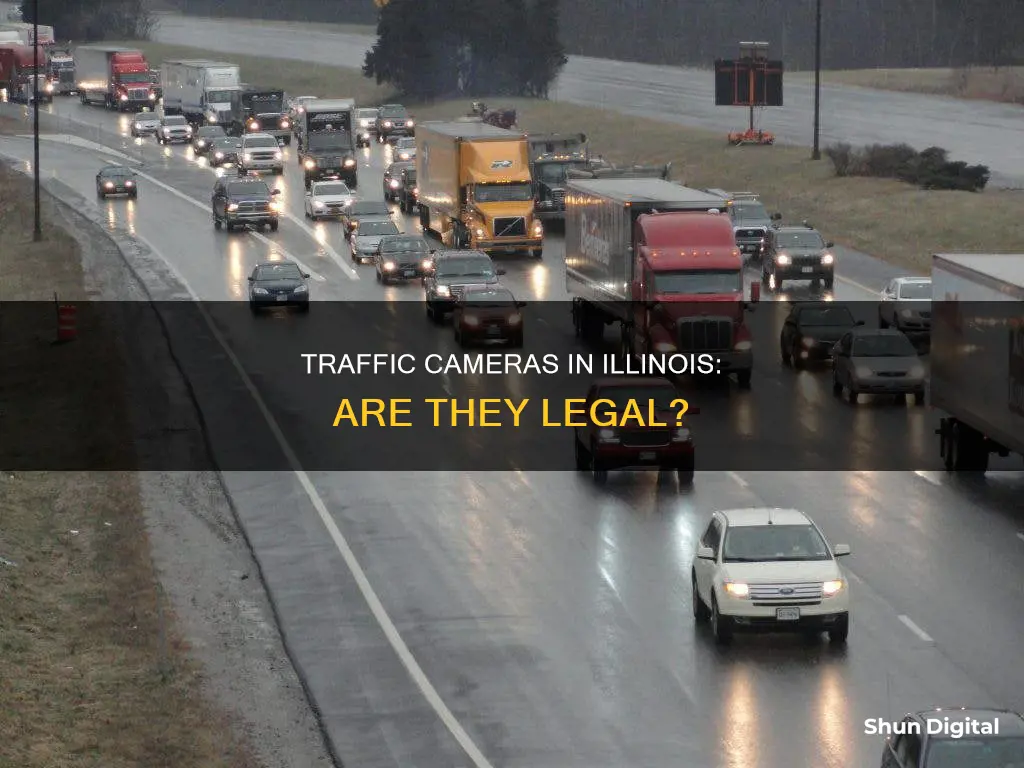
Traffic cameras are legal in Illinois and are used to monitor driving behaviour and enforce traffic laws. They are often placed at intersections to capture vehicles driving through red lights or running red lights, with the images used as evidence for traffic tickets. While these cameras are set up to improve road safety, some may view them as intrusive, as they can capture identifying details such as license plates and the faces of drivers. Obtaining footage from these cameras after an accident can be challenging, as they are often operated by third parties, and a subpoena may be required.
| Characteristics | Values |
|---|---|
| Purpose of traffic cameras | To catch drivers running red lights, to improve safety, and to save lives |
| Camera function | Takes multiple images of vehicles driving through red lights, including license plates, drivers, and offenses |
| Ticket payment | Tickets can be paid online, and cost $100 if paid within the given time, and $200 if paid late |
| Ticket dispute | Tickets can be disputed, but it is "nearly impossible" |
| Ticket deadline | 30 days from the date the ticket was issued |
| Ticket search | Tickets can be searched online using license plate number |
| Ticket footage | Footage is available online for 2 years |
| Ticket record | Tickets do not appear on driving records |
| Camera locations | Found in larger metro areas, including the greater Chicago region |
| Number of impacted intersections | 149 |
| Camera operation | Third parties operate most Illinois cams |
What You'll Learn

Red light cameras
How Red Light Cameras Work
Illinois State Laws on Red Light Cameras
The Illinois Vehicle Code allows the following eight counties to implement Red Light Running (RLR) Enforcement Systems: Cook, Lake, Kane, DuPage, McHenry, Will, Madison, and St. Clair.
Municipalities must conduct and share a statistical analysis of the safety impact of their red light camera systems. Jurisdictions must provide at least two images or a video of the violation to the vehicle owner. The time, date, and location of the violation must be included in the citation. The vehicle owner must be notified in writing no later than 90 days after the violation.
A driver can’t be ticketed for a violation if they came to a complete stop before they entered the intersection—even if they went over the stop line or crosswalk line. However, this exception does not apply if there was a bicyclist or pedestrian present in the intersection.
What to Do if You Receive a Red Light Camera Ticket in Illinois
If you’re issued a citation by a red light camera in Illinois, you’ll have 20 demerit points added to your driving record and you may be charged with reckless driving. If you caused a collision where someone was hurt or killed, those charges could be upgraded to vehicular manslaughter.
In the case of a simple red light ticket, you may be able to keep the conviction off your record by paying the ticket and completing traffic school. If you think you received the citation in error, you may be able to challenge it.
If you believe that you were ticketed fairly, the easiest way to handle your red light camera ticket is to pay it. Make sure you don’t procrastinate for too long—if you don’t pay the ticket within 25 days, the fine will double.
How to Fight a Red Light Camera Ticket in Illinois
Red light camera programs can be effective, but sometimes people are mistakenly ticketed. Because Illinois has very specific rules that regulate how red light cameras must be operated, you may have better luck challenging the ticket than you would in another state. Here are some tips to keep in mind:
- Read the ticket carefully. If any of the information listed is incorrect or incomplete (like the make and model of your car), you may be able to use that in your defense. In particular, check whether the make of your car is listed as “OTHR”—it could cast doubt on whether your vehicle was actually present.
- Watch the video. If you were making a right turn on red, check to see if the video shows you coming to a complete stop—or maybe there was still a yellow light while you were making a turn. Illinois law requires law enforcement to allow you to see the video or photos that were taken at the time of the violation. Check your ticket for more information on how to view the video.
- See if there’s a viable excuse for the violation.
Cleaning Your Blurry Computer Camera: Tips and Tricks
You may want to see also

Traffic data cameras
In Illinois, traffic data cameras are legal and commonly used. Illinois has a robust system of traffic monitoring, which includes the use of traffic data cameras and other automated enforcement methods. The Illinois Vehicle Code permits various types of automated enforcement, including speed enforcement in work zones and safety zones, red-light running enforcement in specific counties, and school bus arm violations.
The data collected by these traffic cameras is valuable for several reasons. Firstly, it aids in understanding traffic patterns and congestion hotspots, allowing transportation authorities to make informed decisions about traffic signal timing and road infrastructure improvements. This data can also be used to identify areas with a high risk of accidents, enabling the implementation of preventive measures such as additional signage or improved lighting conditions.
Additionally, traffic data cameras play a crucial role in traffic management and road safety. By monitoring traffic flow, transportation agencies can detect and respond to incidents more effectively, such as accidents or road obstructions. Real-time data from these cameras can be used to reroute traffic, deploy emergency services, or provide travellers with up-to-date information about road conditions.
Illinois also offers public access to traffic camera data through platforms such as the Illinois 511 Traffic Cameras app. This app allows users to view CCTV traffic cameras, create custom camera groups, and quickly check road conditions along their routes. This level of transparency not only empowers motorists but also fosters a sense of accountability within the transportation system.
Olympus Cameras: Crafted in the Heart of Japan
You may want to see also

Automated speed enforcement cameras
The purpose of these cameras is to reduce the number and severity of crashes related to speeding and distracted driving in work zones. While work zone speed limits and fines apply regardless of the presence of workers, the use of automated speed enforcement cameras is restricted to when workers are present. This technology aids in capturing speeding violations, with images clearly showing the vehicle, its license plate, the driver, and the offense.
The use of these cameras is not limited to work zones and safety zones. The Illinois Vehicle Code also allows for Red Light Running (RLR) enforcement in eight counties in the Metro East and Chicago area: Cook, Lake, Kane, DuPage, McHenry, Will, Madison, and St. Clair. These RLR systems aim to reduce the severity of crashes at intersections caused by vehicles running red lights.
The consequences of a traffic violation recorded by an automated speed enforcement camera are the same as for any similar violation of the Illinois Vehicle Code. The registered owner of the vehicle will receive a Uniform Traffic Citation, which includes the vehicle owner's name and address, the vehicle registration number, the offense charged, the time, date, and location of the violation, the first available court date, and an explanation that the citation is based on the photograph or recorded image from the automated system.
It is important to note that the use of automated speed enforcement cameras is subject to certain limitations. The Illinois State Police must conduct a public information campaign to inform drivers about the presence of these systems, and signs indicating automated speed enforcement must be clearly posted in the areas where they are in use. Additionally, photographs obtained through these systems are confidential and only accessible to specific individuals, such as the vehicle owner, the offender, and law enforcement officials.
Kodak AZ652 Camera Battery: What's Inside?
You may want to see also

Police dashcam footage
Traffic cameras are legal in Illinois and are used to monitor driving behaviour and enforce traffic laws. These cameras are typically placed at intersections to capture vehicles driving through red lights or running red lights. The footage is used to issue traffic tickets, which are sent to the registered owner of the vehicle within five to seven business days. While these tickets can be costly, they are not considered moving violations and will not appear on your driving record or increase your insurance rates.
In addition to red-light cameras, Illinois also employs speed cameras, particularly in work zones and safety zones, to enforce speed limits and reduce the number and severity of crashes. The Illinois Vehicle Code authorises the use of automated enforcement in certain situations, including speed enforcement in work zones and safety zones, red-light running enforcement in specific counties, and the monitoring of railroad grade crossing gate and school bus arm violations.
Now, let's focus on police dashcam footage in Illinois:
In the case of an accident, obtaining dashcam footage from police vehicles can help determine fault and liability. It can also assist in recalling the events of the incident, especially if there is confusion or disagreement about what occurred. An Illinois traffic accident attorney can help individuals identify the officer and precinct associated with the footage and make an official request to obtain the recording.
Additionally, police dashcam footage can be used to promote transparency and accountability within law enforcement. In the case of the Aurora Police Department, dashcam footage was released to the public following the arrest of a woman during a traffic stop. The footage showed an officer pulling the woman out of her vehicle by her arm, which sparked a debate on social media about the use of force. The police department released the video to provide context to the incident and address the concerns raised by the online community.
It's important to note that Illinois state law mandates that recordings from police body-worn cameras and dashcams be saved without alterations for a minimum of 90 days. This allows individuals involved in incidents or their legal representatives to request the footage within a reasonable timeframe.
Traffic Cameras: Do They Issue Tickets?
You may want to see also

Private entity footage
In Illinois, traffic cameras are often operated by third parties, making it difficult to access the footage. However, if an accident occurs in front of a store or a private residence, and you need to prove that you incurred personal injuries or property damage, an attorney can help you obtain the necessary evidence. While private entities are not obligated to provide their camera information, an accident attorney may be able to assist by submitting a subpoena to the owner of the private residence or business. This can provide valuable evidence to support your case and prove liability.
Video evidence obtained from private entity footage can be crucial in removing doubt and establishing fault in confusing or disputed accident scenarios. It can also help you recall the events of the accident and strengthen your claim. Obtaining this footage in a timely manner is important, as some traffic camera footage may only be available for a limited period, such as 30 days or two years, depending on the type of camera and the location.
In addition to private entity footage, there are various other sources of traffic camera footage in Illinois. These include actual traffic camera videos, such as violation footage from red-light cameras, automated speed enforcement cameras, and traffic data cameras. Other sources include business security cameras, dashcam footage from police vehicles, and cameras on private property, such as home surveillance systems or business security cameras.
To obtain footage from the City of Chicago's 24-hour streaming video, videos from red-light cameras, or video from police observation device cameras, a Freedom of Information Act (FOIA) request is typically required. An attorney can guide you through this process and ensure that you meet any deadlines associated with your case.
Repairing HTC Camera Buzzing and Focusing Issues
You may want to see also
Frequently asked questions
Yes, traffic cameras are legal in Illinois.
There are two types of traffic cameras in Illinois: red light cameras and traffic data cameras. Red light cameras take pictures of vehicles when they drive through a red light and are used to issue tickets. Traffic data cameras are used to collect data and improve the timing of traffic signals.
Red light cameras are typically found in larger metro areas, such as the greater Chicago region. As of 2021, there were 149 local intersections with red light cameras in Illinois.
If you receive a ticket from a red light camera, you can expect to pay a fine of $100. The ticket and fine information will be mailed to the registered owner's address within 5 to 7 business days. It's important to pay the ticket on time to avoid additional fines or vehicle seizure.
Obtaining traffic camera footage in Illinois can be challenging as most cameras are operated by third-party organizations. If you need footage for a legal case, it's recommended to contact an Illinois car accident attorney who can guide you through the process and help you acquire the necessary evidence.



